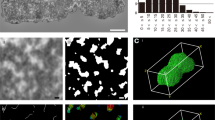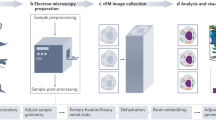Abstract
As a field of research, human cytogenetics is only 9 years old, but outstanding results have already been reported in numerous diseases. Further advances depend now essentially on the resolution of the microscope; as the limits of the optical system seem to have been reached, important new developments in cytogenetics should not be expected.
This is a preview of subscription content, access via your institution
Access options
Subscribe to this journal
Receive 51 print issues and online access
$199.00 per year
only $3.90 per issue
Buy this article
- Purchase on Springer Link
- Instant access to full article PDF
Prices may be subject to local taxes which are calculated during checkout
Similar content being viewed by others
References
Du Praw, E. J., Proc. U.S. Nat. Acad. Sci., 53, 161 (1965).
Du Praw, E. J., Nature, 206, 338 (1965).
Hotta, Y., and Bassel, A., Proc. U.S. Nat. Acad. Sci., 53, 356 (1965).
Wolfe, S. L., J. Ultrastruct. Res., 12, 104 1965.
Author information
Authors and Affiliations
Rights and permissions
About this article
Cite this article
GOVAERTS, A., DEKEGEL, D. Electron Micrography of Human Chromosomes. Nature 209, 831–832 (1966). https://doi.org/10.1038/209831a0
Published:
Issue Date:
DOI: https://doi.org/10.1038/209831a0
This article is cited by
-
Hierarchy of organization in eukaryotic chromosomes (a review)
Acta Biotheoretica (1971)
-
Elektronenmikroskopische Untersuchungen menschlicher Metaphasen-Chromosomen
Human Genetics (1967)
Comments
By submitting a comment you agree to abide by our Terms and Community Guidelines. If you find something abusive or that does not comply with our terms or guidelines please flag it as inappropriate.



